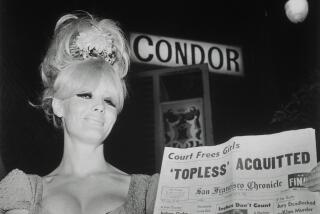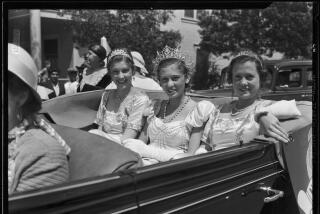Pinup girl is never fully bared
- Share via
Bettie Page was neither the alpha nor the omega of pinup posing, she didn’t do it first or last, but no one before or since has brought the same kind of incandescent delight to the job of being photographed in bathing suits, bondage apparatus or nothing at all. Which makes it all the more remarkable that the new film about her life and times, “The Notorious Bettie Page,” is so completely glum, joyless and devoid of emotion.
Page’s ability to come completely alive in front of the camera made her a cult figure during the post-World War II years of her prime and a modern popular culture icon whose official website has received about 600 million hits since 2000. The new film captures the look of the period and, in star Gretchen Mol, has an actress who capably counterfeits Page’s exuberance. What it doesn’t have is a reason for being.
As directed and co-written by Mary Harron, the uninvolving “Bettie Page” holds all actions at the same kind of ironic distance that characterized Harron’s earlier films, “I Shot Andy Warhol” and “American Psycho.”
Harron has said she was determined to be nonjudgmental about Page, to do justice to the woman’s “mystery and ambiguity.” In practice, however, that attitude plays as coldness, and Page, for all her remarkable zest, comes off as a not terribly interesting person we’re given no incentive to become involved with. The problem is not the film’s refusal to be what the director calls “reductive,” it is in its inability to make Page someone whose story can hold us.
Worse than that, audiences flailing around for a point of view will find that the film, so careful about its subject, has no such scruples where the opposite sex is concerned. Though there are exceptions, most of the invariably manipulative men in Page’s life are venal, almost panting creatures whose hidden agendas and corrupting lusts taint everything they do.
The fact that the ethereal Page is portrayed as having the saint-like ability to rise above all this doesn’t make its one-dimensional portrait of men any less like something Warhol-shooter Valerie Solanis, the subject of Harron’s first film and the founder of SCUM (the Society for Cutting Up Men), might approve of.
Interestingly shot by Mott Hupfel in both color and black and white, “Bettie Page” begins in 1955, near the end of its subject’s modeling career. We take you now to one of those seedy Times Square bookstores, where men furtively scan magazines with titles like Wink, Whisper and Flirt, and ask the clerk if he has “anything a little different, something with unusual footwear” or “material that shows restraint.”
The clerk knows that’s code for bondage, but when he produces the goods he is busted as part of a congressional investigation of pornography. We first meet Page demurely waiting outside the hearing room where she has been called to testify, the soul of shy, soft-spoken politeness down to the white gloves on her hands. How did a good Southern lady get in a fix like this?
Back we go to Nashville, 1936, and a teenage Page dealing with a father who might be molesting her and a stern mother who refuses to allow her daughter to date. Page just misses out on a college scholarship and marries young to a violent husband, whom she leaves only to be sexually assaulted by a group of men. Is it any wonder that in 1949 she hops a Greyhound and flees to New York?
Noticed on the beach by an amateur photographer, Page soon becomes a sought-after model, a good soul whose mottos are “What’s the harm in it?” and “I sure can try.” She comes to the attention of bondage-meisters Irving Klaw (Chris Bauer) and his sister Paula (Lili Taylor), who treat Page like family while involving her in outre bondage poses.
The film leaves Page, always a religious person who occasionally muses, “I don’t know what God thinks about this,” having a born-again experience and rededicating her life to Christ. Her real-life later years, including a charge of attempted murder and years spent in a mental hospital, are outside this film’s purview. For which we should be grateful.
*
‘The Notorious Bettie Page’
MPAA rating: R for nudity, sexual content and some language
A Picturehouse release. Director Mary Harron. Screenplay Mary Harron, Guinevere Turner. Producers Pamela Koffler, Katie Roumel, Christine Vachon. Director of photography Mott Hupfel. Editor Tricia Cooke. Running time: 1 hour, 31 minutes.
In selected theaters.
More to Read
Only good movies
Get the Indie Focus newsletter, Mark Olsen's weekly guide to the world of cinema.
You may occasionally receive promotional content from the Los Angeles Times.











